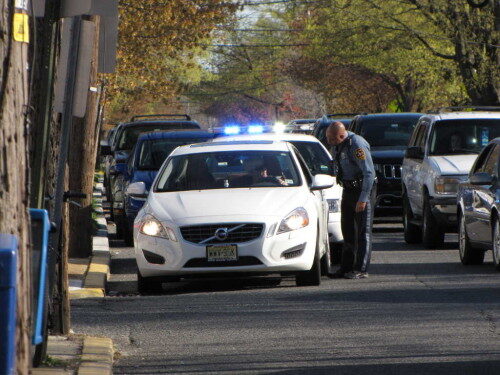
By JOHN T. WARD

Routine use of the cameras is inevitable, McConnell tells redbankgreen. But he’s not a strong believer that they’re necessary, and at present, they’re beyond his budget, even with the free money.
Under a grant announced in December by the state Attorney General, Red Bank was to be one of 176 towns statewide to split $2.5 million to buy an estimated 5,000 cameras and ancillary equipment.
The borough’s share of the pot was about $9,000 under the program, or enough to buy 20 cameras, according to a list published by nj.com.
But McConnell estimates the true number of cameras his department could buy was half that — and the grant didn’t cover the bigger expense associated with video: data storage.
The volume of data would be “numerous times” that of the images captured by dashboard cams, which are installed in all patrol vehicles and now costs the town about $30,000 a year.
In addition, RBPD would need 18 body cameras to provide coverage on all shifts, with allowance for cameras not in service while recharging, McConnell said.
“The other issue I have is that the technology is changing rapidly. It’s getting better and better,” McConnell said. Clarity of images is improving, and the field of view keeps widening to include activity that earlier generations of the devices could not capture, he said. That range is now at 140 degrees, up from 90, he said.
“I expect that to improve, but if we buy now, we’re kind of stuck” with technology that will soon be obsolete, McConnell said. “Delaying it for a year I think is for everyone’s benefit, the police officers as well as the public.”
McConnell said he has informed Monmouth County, which administers the grant, that he won’t be using the funds.
McConnell also voiced reservations about the Attorney General’s guidelines on body camera usage, which he said require an officer to narrate a voice recording what’s happening when a camera’s not turned on. Subjects have the right to ask police not to record, and unless there’s a compelling reason otherwise, the officer must comply, he said. McConnell said the narration requirement is unrealistic, as it asks a cop to create a verbal record even as he or she is speaking to someone.
The car-mounted dashcams stay on during stops, he said.
The department is using two body cameras on traffic stops to determine how effective they are, how much data they require and more, McConnell said.
McConnell said he has informed Monmouth County, which administers the grant, that he won’t be using the funds.
McConnell’s decision to delay the purchase, he acknowledged, comes at a particularly tender moment in police relations nationally, with numerous examples of questionable or outright criminal behavior by cops caught on video. But body cameras aren’t a panacea, he suggested.
Moreover, they’re a costly reaction to something that has not been a problem here, he said.
Out of the nearly 8,000 traffic stops and 20,000 calls for service logged by borough cops last year, 17 internal affairs cases were generated, McConnell said.
Nine of those were rule infractions that are “generally administrative, and initiated by supervisors or myself,” he said. Two were from citizens complaining about an officer’s demeanor; two concerned deferential treatment; one alleged an improper search, two alleged excessive force, and one was categorized as “other criminal,” an example of which is “someone who alleges money or valuables were missing while in custody,” McConnell said.
Of the eight filed by citizens, six have been cleared by RBPD investigators. The two excessive force allegations, which are handled jointly by the RBPD and the Monmouth County Prosecutor’s office, are still pending, he said.
“I think the perception [of widespread abuses by police] is not the reality,” McConnell said. “We certainly haven’t seen any increase in complaints against our officers.”





















